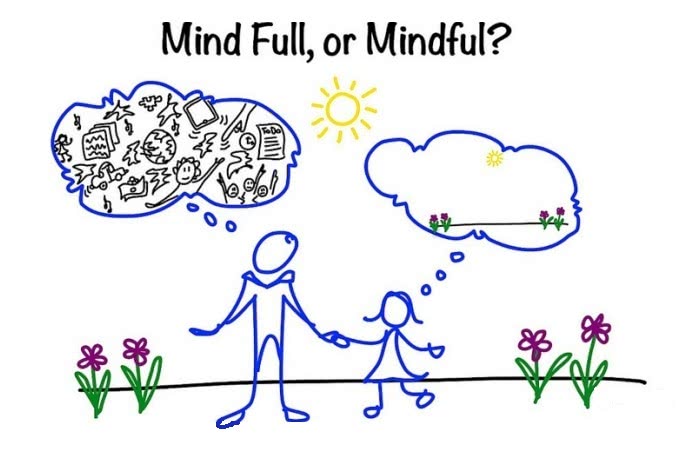The Difference Between Secular and Christian Spirituality

Fr Jimmy Bonnici outlines the difference between secular and Christian spirituality with an emphasis on mindfulness.
| Values in Secular/Self Spirituality | Values in Christian spirituality |
| Search for oneself and a harmonious lifestyle | A desire for a harmonious lifestyle, search for God |
| Return to the individual | Contact with the sources of life |
| The individual decides the criterion of spirituality | Free from expectations |
| Effort | Gratitude |
| Emptying oneself | Emptying and opening/making space for the Other |
The difference between secular and Christian spirituality
Secular Spirituality – When exploring secular spirituality I will limit myself to what I refer to as ‘self-spirituality’. This word relates to world views and practices grouped under the New-Age umbrella and should be distinguished from world views and practices that we find in Oriental religions. The point of departure for self-spirituality is often a well-intentioned care of the human person, his or her well-being especially in the context of a stressful rhythm of life. Values like the search for balance, equilibrium, and a more humane life-style is not only laudable but urgent. Yet secular self-spirituality, while promising a lot, can reinforce the root of the problem.

In a way, it responds to a new cultural context where the point of departure is the individual. But it reduces spirituality to the choice of the individual with the deciding criterion being “at-the–service-of-self . This picking and choosing from the supermarket shelf what suits or soothes the individual, can rob the person from contact with the sources of life given that a person cannot be the source of his/her own life. Rather than helping the person face the paradox of life – finding self through going out of oneself/one’s ego – the individual returns only to oneself. This leads either to self-absorption, and possibly despair when facing one’s limits, or to arrogance when one’s limit is not faced and the other is seen merely as a threat.

Christian Spirituality – In a Christian/God-oriented spirituality, the same search for oneself and for a harmonious lifestyle is addressed through a recognition of one’s being created. This leads to an openness to the ground of one’s being. Freedom from the expectation that one should have all the resources within oneself, one stands in the presence of a deep acceptance by the One who affirms me into being. In this case, spirituality is this openness to let Life flow in me. It leads to gratitude and joy rather than effort and more stress. It implies letting go of the ego that when affirmed easily becomes violent (on self and others) in order to be receptive to a love that leads to joyful creativity.
The difference between secular mindfulness and mindfulness in the Christian tradition
Secular mindfulness – In the West, mindfulness is promoted for the general well-being in society especially in places of work and schools. In contrast to rumination and worry that often contribute to mental illness and anxiety, the practice of mindfulness (through meditation and other kinds of training) helps the person to bring attention to the internal experiences occurring at the present moment. In its original context, Buddhism, is related to spiritual enlightenment.

Christian mindfulness – In ways similar to other traditions, in the Christian way, there are a number of practices that help the person to calm down, to increase in a sense of awareness of what is happening in oneself, of observing thoughts and feelings and then to go beyond them. Yet, even when the emphasis is on ’emptying oneself’, it is always an “openness and “making space for the Other. It comes out of a trust that there is God, that God is positively affirming my life (not a competitor), and out of a desire for an encounter with God and union with God.
Moreover, this process includes a deep silence wherein the person is invited to be still and learn to be present, to receive, and to observe and thus slowly letting go of the desire to grasp, clutch, control, and be driven by greed. It is an openness to listen to a depth that precedes me and that gradually leads to a deeper appreciation of every being who comes in my way. It is also a process of ever deeper interior freedom: freedom both from internal destructive instincts and from exterior forces that seek to force me into inauthentic ways of life at the service of consumerist ideals or others.

This process of mindfulness helps the person to let go of the need for success, performance and outcomes in the time of prayer. Rather the focus is directed to being and to meeting. Thus the following expressions capture something peculiar to this form of prayer, contemplation: ‘looking’, ‘being aware’, ‘being conscious’, ‘paying attention to’, ‘being there’. At that depth there are no thoughts, no images, no kinds of considerations, no ‘making it happen’. As Franz Jalics SJ puts it “Everything happens through looking (gazing) and being.
The benefits of mindfulness in one’s life of prayer and faith
Like the branch of a vine tree, the human person has a desire for life and to give fruit, a search for meaning and a sense of purpose. Yet if the focus of the person is on itself, on its performance and outcomes, on making a name for itself, pushing for results, to produce fruits in order to impress, it actually loses the very possibility of giving fruit. Whereas in the process of prayer, one focuses on the link with the tree. One lets go of the preoccupation with self and expectations of others, and recognises that without the sap that comes through union with the tree (Jesus Christ), there could be no branch and no fruit. Rather than grasping it involves stillness, being, being present to, letting go of ego in order to receive life (the Holy Spirit).

Moreover, this kind of stillness, mindfulness, becomes a place for deeper communication and communion. When we are in the presence of ourselves and of God, we give space not only for our deeper self and sometimes deeper hurts to surface but also for the ever deeper acceptance of God to heal us. As Frans Jalics SJ puts it: “Silence before God where stillness is a pearl diver: it dives down to the very depth of our being and returns to the surface with a wound, unsuspected and distressing. Its discovery is hurtful, but God can take it up and heal it because genuine stillness is nothing less than God himself.

Read more:
– Mindfulness in the Christian Tradition
– (BOOK) Franz Jalics, The Contemplative Way. Quietly Savoring God’s Presence, Mahwah NY 2011
– Feeling Insecure: Love as the Greatest Security














